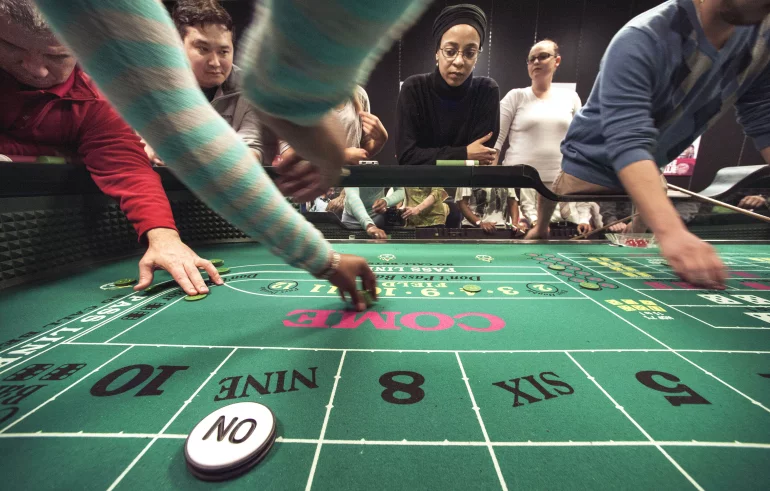
Craps tables are always lively and overflowing with emotions. This gives cheaters extra opportunities for fraud. In this article, we will talk about a scam that successfully allowed cheaters to beat the casino for quite a long time.
What Did the Cheaters Do?
The idea was to replace the chips after the winning roll of the dice. This scheme is similar to the Savannah. This cheating involved several people. Two of them were the main actors, and the others carried out support functions.
One of the main participants was a simple executor, and the second, if I may say so, "shaking his rights".
They played at the crowded tables, and the performer was right next to the playing field, and the second one was behind him. The primary executor has been betting three red chips of 5$ each on the Pass Line for a while.
- As a reminder, he could win with the shooter at this bet if he rolled 7 or 11 at the first shot.
- If the score was 2, 3, or 12, they lost.
- Any other score was Point, and the shooter had to roll again until he landed the Point and won or seven and lost.
When the bet was lost, the executor staked the exact amount before the next throw. If the bet won, he waited for payment and then replaced three 5$ chips that originally were there with two of 500$ and one of 5$. Of course, the 5$ chip was on top. The replacement was done with one hand's quick and precise movement while collecting winning chips from the field.
What Was the Role of the Second Guy?
At this stage, the second member came in. He quietly substituted a stack of 500$ chips next to the first guy's bet and immediately claimed the dealer to improperly paid his bet. He pointed to the bet on the field (already replaced by the first cheater), the large stack of chips next to the player, and the paid chips.
At this moment, he slightly clapped the dealer's hand, bringing him out of psychological balance and causing him to hesitate. Our regular readers know how important it is to affect the dealer psychologically.
The important part of this cheating was that neither the dealer nor any other casino employees serving the table paid attention to the second cheater until he began to make claims.
If it were made by the guy who played for $15, everything would look suspicious. Meanwhile, in this situation, it was done by the player who was supposed to make his first bet. Tracing who put these chips was challenging in a large crowd of players. Besides, it was next to a large pile of chips, evidence that he was ready for high bets. Moreover, everyone knows some casino visitors who make rare but high bets.
What Were the Roles of Other Team Members?
This team acted well-adapted, and each participant only performed their task, minimizing their responsibility.
- One was only making small bets and replacing chips as soon as payouts were made.
- Another one only proved a dealer's mistake.
- The other guy was not directly involved in the cheating but carefully monitored the situation to provide security.
- The fourth participant had a strategic role.
He was also at the table but stood a little further away from the dealer than the first two players. He bet $15$ on the Pass Line, which helped to implement the first participant's chip substitution. The dealer who paid out the wins immediately turned to the next winner, who rushed him. Moreover, having several bets of three $5$ chips each on the field, the dealer often didn't bother himself checking them carefully every time.
If the fake bets were paid (which happened almost always), the player's next bet was $205$. That is, he bet two 100$ chips, one 5$ on top. This was supposed to clear him and convince the casino management that he always plays like that. This was the last bet in their game, even if they lost.
Three members quietly left the casino, and only one guy, supposed to provide security, remained in the hall. He had to figure out how impressed the casino security was by the incident to know whether they could return here.
If the maximum bet at the table allowed that, this cheating was also carried out with 25$ and 1000$ chips, and sometimes even 100$ and 5000$ chips. This team also had more complicated options, which included replacing the Odds bets. This required the exceptional skill of the executor.

































